We should put a stop to the red complex!
Jeju 4·3 was a resistance carried out by ordinary people!

Jeju 4·3 testimony by Lim Chung-gu (born in 1944 in Daerim-ri, Hallim-eup; now living in Gimpo, Gyeonggi Province)
“I have lived in bitter grief my whole life with both tears and hope that the red complex, or the guilt-by-association system, which has heavily suppressed my family and me so far, will be lifted so that we can recover the basic human right of pursuing happiness.”
Lim Chung-gu read this as the final statement at Chamber 201 of Jeju District Court on Oct. 4, 2022. He was the son of the late Lim Won-jeon, a victim of Jeju 4·3 who was at the center of the police’s ideological verification process. The son, who is only a month away from turning 80 years old, told us his 4·3 story and about the red complex that shackled his entire life.
Interviewed and arranged by Cho Jeong-hee,
Leader of the Memorial Project Team
Having lived my life without mentioning a single thing about my father
At the time, my father was a government employee working at the Aewol-myeon (now Aewol-eup) Office. Honestly, there is not much I can remember about him except for the last time I saw him. I met my father at a mill next to my home one evening.
“Be a good boy to your mother, son.”
My father told me to be a good boy to my mother and take care of my younger sister. He was nowhere to be found after that. I believed my father was locked up in Mapo Prison for nearly half a century.
I heard the North Korean Army entered that prison after the Korean War broke out. So, there was only a slight possibility that my father had changed sides (to North Korea). But there was no evidence at all, and it was because no one ever told me the whereabouts of my father, nor was there anyone who notified me why he had to die and where. I have lived my life without mentioning or asking anything about my father.
“Now, you be here, and I will pick you up tomorrow.”
After my father went missing, however, I could never be calm. Nor could I sleep.
“Now, you be here and relax. I will be here to pick you up tomorrow.” My mother took me to a stranger’s home. I was six years old. I believed what my mother told me. But my mother never came the next day or the day after.
“Eliminate him, and his whole family will go extinct!”
I found out that my mother planned to save me from the hands of the Northwest Korean Youth Association, who were hellbent on exterminating our family. We moved from one stranger’s house to another, spending several days, a few weeks, or longer. I remember my mother, who was so reluctant to leave me alone in the arms of a total stranger. I spent many sleepless nights telling myself my mother would come for me the next day.
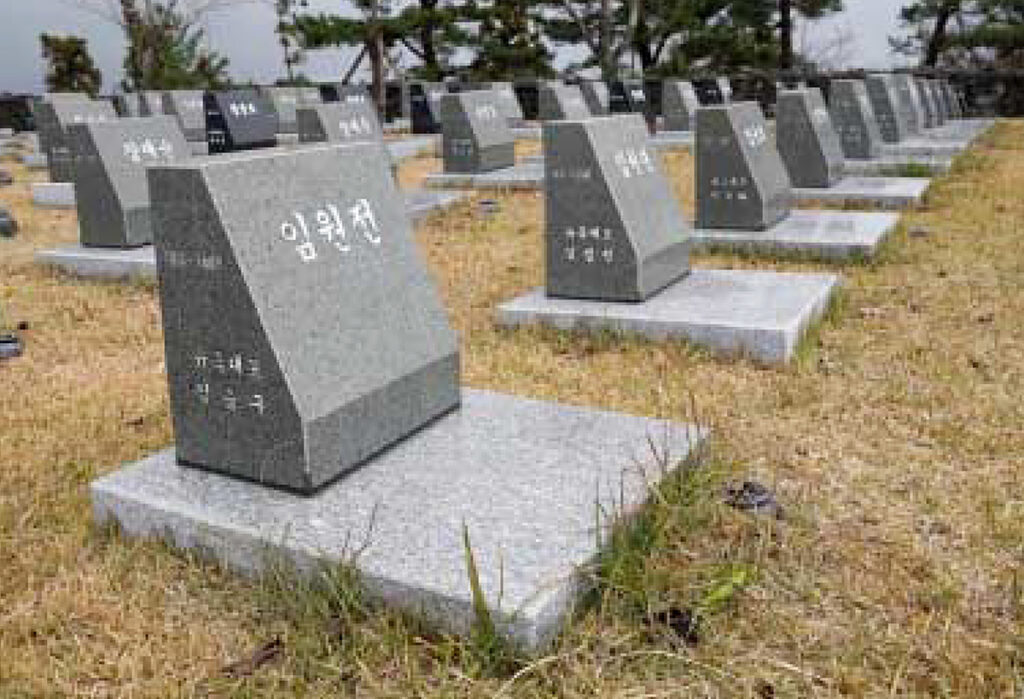
Grave marker of Lim Won-jeon, in Jeju 4·3 Peace Park.
The remains of my mother: her gold tooth and hemp clothes.
I was born in January, so I had to enter primary school at seven. The children who lived in Daerim-ri were assigned to Suwon Elementary School. But I entered Hallim Elementary School because she thought it was a better place for me. In August of the same year, my mother was caught and imprisoned in a fishery warehouse in Hallim. I could not visit her, even knowing of her capture. Six years later, I could recover my mother’s remains. She had been shot dead at the old ammunition storage area in Seodal Oreum in Moseulpo. There was no flesh left, only the bones. Luckily, my mother was recognized due to her gold tooth and hemp clothes. I was only 13, so I could not take part in identifying my late mother. Fortunately, relatives helped me bury her in Manbengdi, along with other victims.
The outbreak of measles and extremely lean years
I lost my mother in the preliminary inspection. My little sister and I were sent separately to our aunts. I was sent to my father’s older sister and my little sister to my father’s younger sister. The older aunt was living with us when Sangdae-ri, the village she used to live in, was burnt. Her husband is also a victim of Jeju 4·3. There were now three of us – me, my aunt, and my cousin, who was one year younger than me – that came to live together.
When I was in the 1st year of elementary school, measles broke out. At the time, there was nothing you could do but separate the affected people and put them in makeshift huts. No proper medicine or treatment was given. I contracted the disease and had to bear the consequences of complications and aftereffects: otitis media. I did not hear well afterwards.
After the Korean War broke out, Jeju suffered bad harvests for three years.
We planted sweet potatoes on 2,300 m2 of land but could only harvest three sacks. We suffered from hunger all the time. Father McGlinchey (Patrick James McGlinchey) would distribute dry milk and corn for free every day after school, and I dropped by Hallim Catholic Church to receive them. I also went to a starch mill to get some scraps of sweet potatoes. I would then hang them over the wall at home to dry them. We ground the dry scraps and mixed it with corn. After adding mugwort that we gathered from fields, we made pudding from the mixture and ate it.
When I was a 4th grader, I was able to gather from the sea. I followed my aunt, Sangjamsu (most-skilled Haenyeo), to the coast. As my aunt picked sea mustard, I caught turban shells, abalone, and octopi. At the time, you could find shells near the rocks on the beach. I did not cook what we harvested. I ate everything raw because I was so hungry. On days when my aunt took her days off, I brought my friends and went to the sea. We made tiny harpoons and used them to catch fish and octopi. During the rainy season, we filled tin pots with small crabs that we used to cook porridge and marinated side dishes. You may think I was well fed with all those sea products I gathered, but the food was never enough.
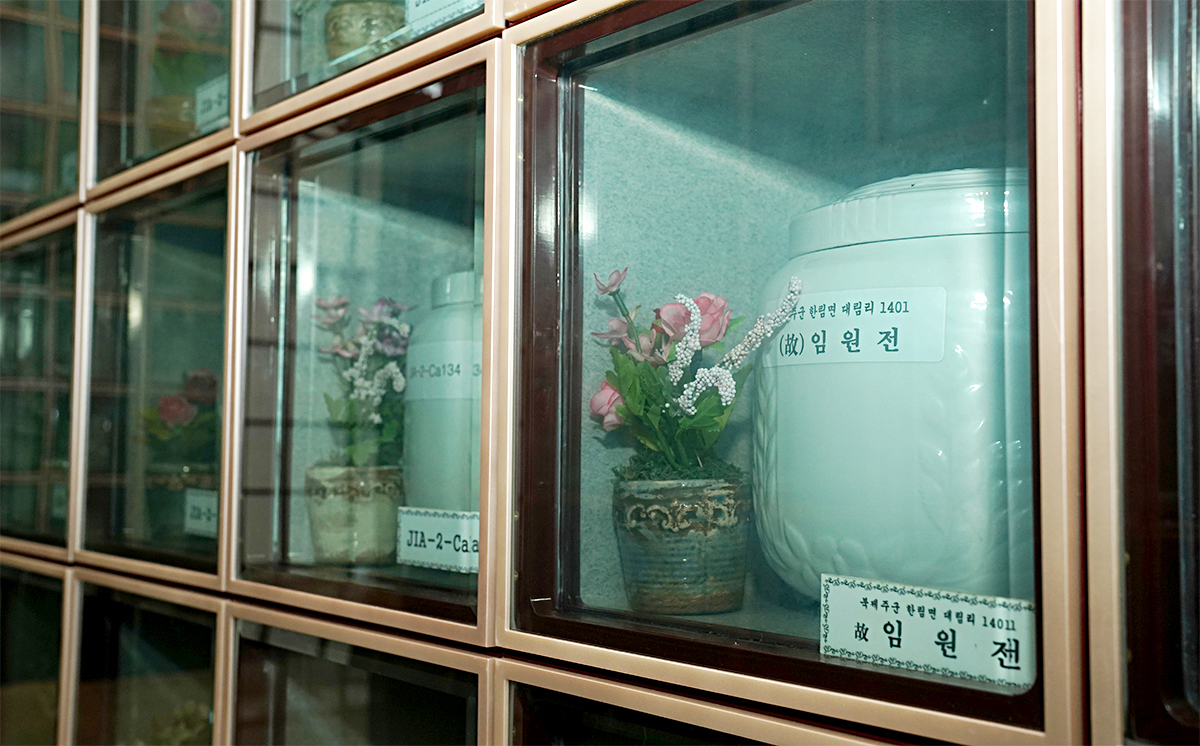
Remains of Lim Won-jeon, laid to rest in Jeju 4·3 Peace Park.
“I would do anything but steal if there is a way for me to study!”
After graduating from elementary school, I could not attend middle school. Instead, I went to a village reading school that taught Chinese characters. As an orphan, I could only dream of studying in an official school. While I attended the village school, I was able to read a lot. However, I always envied my friends who wore uniforms and attended middle school. Then, I met Sergeant 1st Class Ahn Choe-ok, who was visiting his hometown, Sangdae-ri. Ahn had been hospitalized in the Army Hospital in Yeosu for his tuberculosis for a long time.
“Hey, Chung-gu, is something bothering you?”
“My friends are all attending school, and I am not.”
“If that’s the case, why don’t you come to Yeosu so that you can attend evening school? You can work during the daytime.”
“I would do anything but steal if there is a way for me to study!”
And so I became a middle school student.
A newspaper boy attending Yeosu Middle School of Commerce
At 14, I left my hometown and went to Yeosu. I stayed in the same ward as Sergeant Ahn and slept on a cot beside his bed. I delivered the newspaper in the morning in the town and returned at around 4 o’clock in the afternoon. I would take two pots and head to the hospital’s kitchen.
“This is my nephew. Give him some food.”
Sergeant Ahn asked the manager of the kitchen to give me some food. The manager would use his shovel to scoop rice and pour soup into the pots I carried. I ate half of the food as dinner and saved the rest for breakfast the next day. After dinner, it was time for me to study. Employees leaving the hospital would give me a ride on a military truck heading for Yeosu Middle School of Commerce. How I loved the time at school. It was past midnight when school was over. I did not get a ride back to the hospital and had to walk about 4㎞. Sometimes I was unlucky and was beaten up by scoundrels on my way back. Nevertheless, I was a diligent student. I yearned to graduate because my father was an educated man who graduated from Jeju School of Agriculture, a prestigious school in Jeju at the time. I wanted to be a decent son to my father.
Trapped by the red complex
At 17, I graduated from Yeosu Middle School of Commerce and returned to Jeju. I worked as a clerk at the village office, as an employee of the local agricultural cooperative federation, and as a farming resource instructor. After that, I became the only person selected as an employee of Daerim Company, founded by Kim Du-jung, a Korean resident in Japan. The company owned heavy equipment like bulldozers, dump trucks, and rock crushers. I worked for over seven years as an administrative director, bought myself a bulldozer, and went independent. I established a heavy equipment rental company, Jeju Junggi (Heavy Equipment), and started my own construction business. When I turned 40, I had a chance to go abroad as a Junior Chamber International Jeju (JC) member on a visit to a sister club in Hong Kong. However, I had trouble with the issuance of my passport. The chairperson at the time, Hyeon Seung-taek, and an architect, Kim Seok-hoon, became my references in issuing my passport. Also, in Hong Kong, there was a note under my room door saying, “Write down everyone you met in Hong Kong and report to Halla Company (Jeju branch of the Defense Security Command) hen you get back to Jeju!”
From the moment I was refused my passport, I felt I was being watched. But I had never thought I’d be monitored, even in Hong Kong.
‘I can never be free from the guilt-by-association system!’
I was scared and could not move freely in Hong Kong. I was trapped inside the red complex myself.
The guilt-by-association system that passed from my father to me
My inability to access education and medical benefits was frustrating but minor. It was the guilt-by-association system that mattered. I could never say that I was the son of Lim Won-jeon, my father, because someone might condemn me as the ‘son of a rioter’ or ‘son of a commie.’ My grandfather, Lim Chang-bang, was a government official overseeing a myeon office. So, instead, I told people that I was the grandson of my grandfather. How scared was I to not even be able to say who my father was?
One day, my brother-in-law who was living in Moseulpo came to me. He passed both tests to become the Jeju Prosecutor’s Office clerk and a correctional officer. But I could not cheer him up.
I just had nothing to say but only looked up at the sky. It turned out he was disqualified from his jobs in both the prosecutor’s office and the prison. What did he do wrong? He never knew who his father-in-law was. What does my father going missing during Jeju 4·3 have to do with my brother-in-law’s failure even after passing all the tests?
I worried sick that my children would be affected by the guilt-by-association system I was suffering from. My son was a brilliant student, and I was worried he might apply for the law department in college. My son ranked 1st in Jeju on the college entrance test and 15th in the country. He was confident about his skills and would quickly get into any department he wanted and pass any test, including the bar exam. So what? Even if he did, he might not be appointed because of the system. I never told him what to do or what not to do. Luckily, my son chose to study science and technology. He went to Seoul National University, Department of Electronic Engineering. Now he works at the headquarters of Intel after getting a Ph.D. in Engineering in the United States.
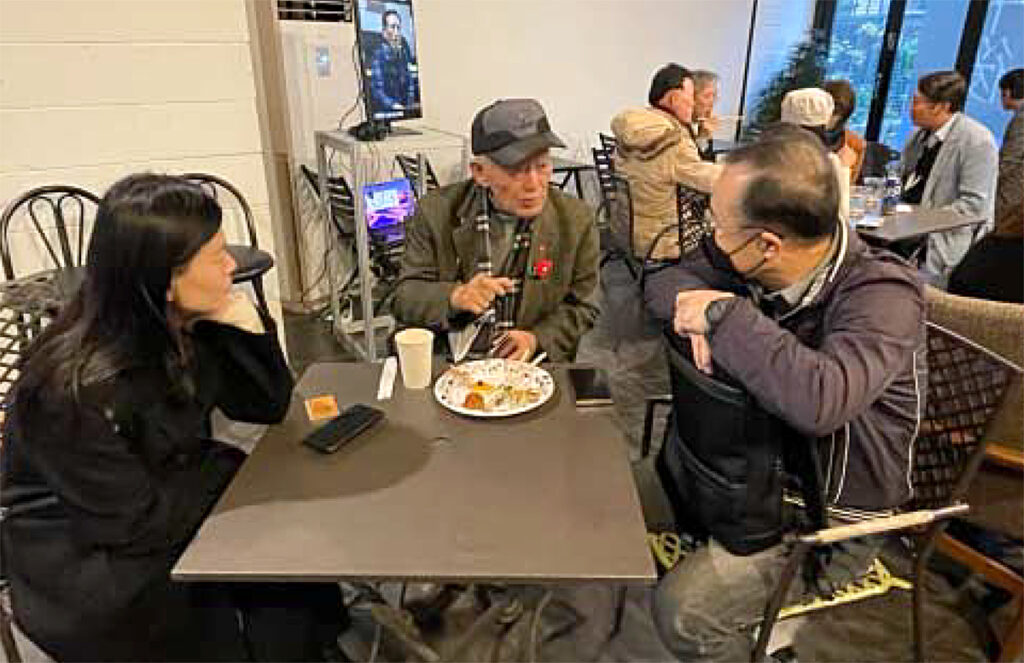
Interview with Lim Chung-gu, who attended “Jeju 4·3 and Friends Story Concert: Hondigagae 4380” held by the Pan-National Committee for Jeju 4·3 at Insadong Court in Seoul on Nov. 5, 2022.
Jeju is heating up!
After the publication of the 2003 Jeju 4·3 Incident Investigation Report, I learned that my father had been illegally buried under the grounds of what is now Jeju International Airport. I read newspaper articles about Jeju 4·3 when visiting my son in the United States in 2006. When I read an article about the excavation of remains at Jeju International Airport, I called my sister in Jeju to sample her blood for DNA analysis. It took 60 years to see my father again. In 2009, he came back to me as a skeleton. At that time, I thought everything would go well. But as the regime changed, right-wing groups filed a constitutional appeal to nullify the Jeju 4·3 Special Act. They even filed administrative litigation to reexamine the already-determined victims. It upset me, and I wrote a column on my blog saying that ‘Jeju is steaming up.’ The Hankyoreh, a newspaper firm, clipped my column and published it.
“Is our society’s political and social foundation so vulnerable that the value of democracy and the standards which we took for granted so far could tumble down in such a short time after the regime change? … The ghosts of the right-wingers are bringing the ideological conflict back to life. They massacred 13,564 victims 60 years ago, and now they denounce every one of them and their families as rioters, which is a spiritual murder… The regime is finite, but the truth of history will not be covered and will last forever. The facts of Jeju 4·3 must be twisted no more! Do not regard the people of Korea and the people of Jeju as ignorant!” (Posted on The Hankyoreh blog.)
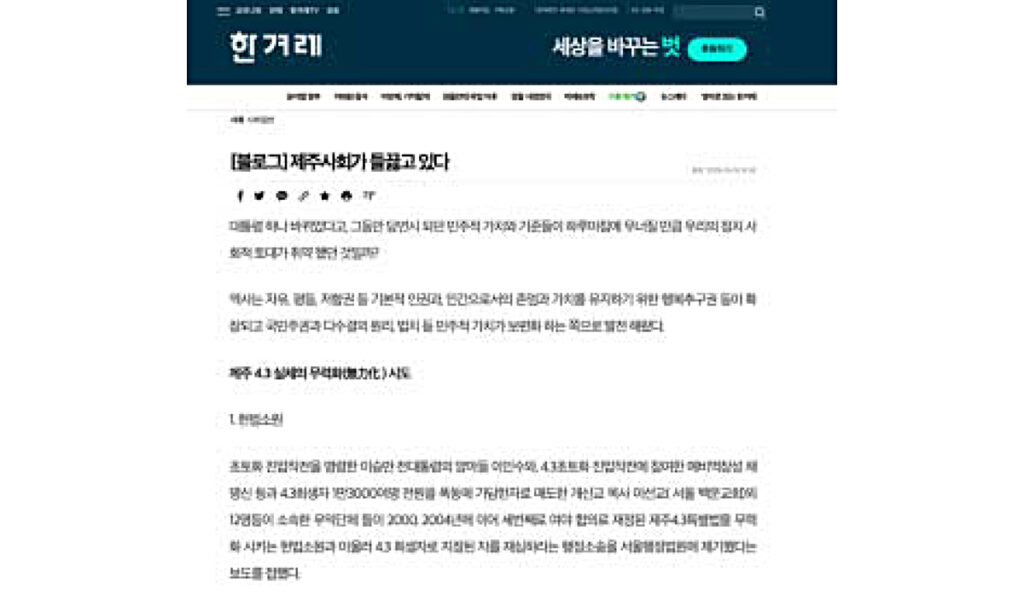
Lim’s column, clipped by The Hankyoreh (March 16, 2009).
Retrial and the deletion of records
In July 2022, I could not stand the news that the Prosecutor’s Office selected my father as one of four people chosen for ideological verification by the Prosecutor’s Office. My father was one of 68 people who (or whose families) requested a special retrial of their sentences that they served during Jeju 4·3. The court was to reexamine whether my father was eligible for retrial, as some far-right organizations denounced him as the ‘leader of rioters in Daerim-ri, Hallim-myeon’ based on their evidence. I contracted COVID-19 the day before the trial date and could not attend. I had to write and submit an extended article saying, ‘What is all this about the red complex, again?’ to the court and the prosecutor. Fortunately, I heard on the news that Kim Jong-min, a Jeju 4·3 Central Committee member, was officially accepted as a witness by the chief judge, Jang Chan-soo. I learned that Kim provided specific data about the screening and determination of the victims of Jeju 4·3 and testified in detail. It was a great relief to me. On the day of the final judgment on Oct. 4, I attended court to appeal the 70 years of my life that I lived in tears. My last words in court were to “declare the innocence of all the accused.” As the prosecutor declared them innocent, I had mixed feelings of sadness and happiness. “All of the accused people are innocent!” said the judge. After the court was closed, I went to the two prosecutors to thank them.
“Thank you. Thank you for my recognizing my father’s innocence.”
“Your father would be proud of you, and we are very sorry.”
I felt the sincerity in their apologies. I am satisfied with the declaration of my father’s innocence. This should never be repeated. It murdered victims two times with the ideological verification process which reexamined the victims, and denouncing them as rioters. It caused great pain to the families as well. Shouldn’t we end this red complex, the guilt-by-association system, already?
To do so, first, the records must be deleted. I want all the documents relating to the death of my father to be deleted. The descriptions from the Prosecutor’s Office and Courts saying that my father was sentenced to death, and the criminal records, should be deleted. That way, I can finally be free from the grasp of the guilt-by-association system and red complex. It is time to stop the dark history that coursed through my life.
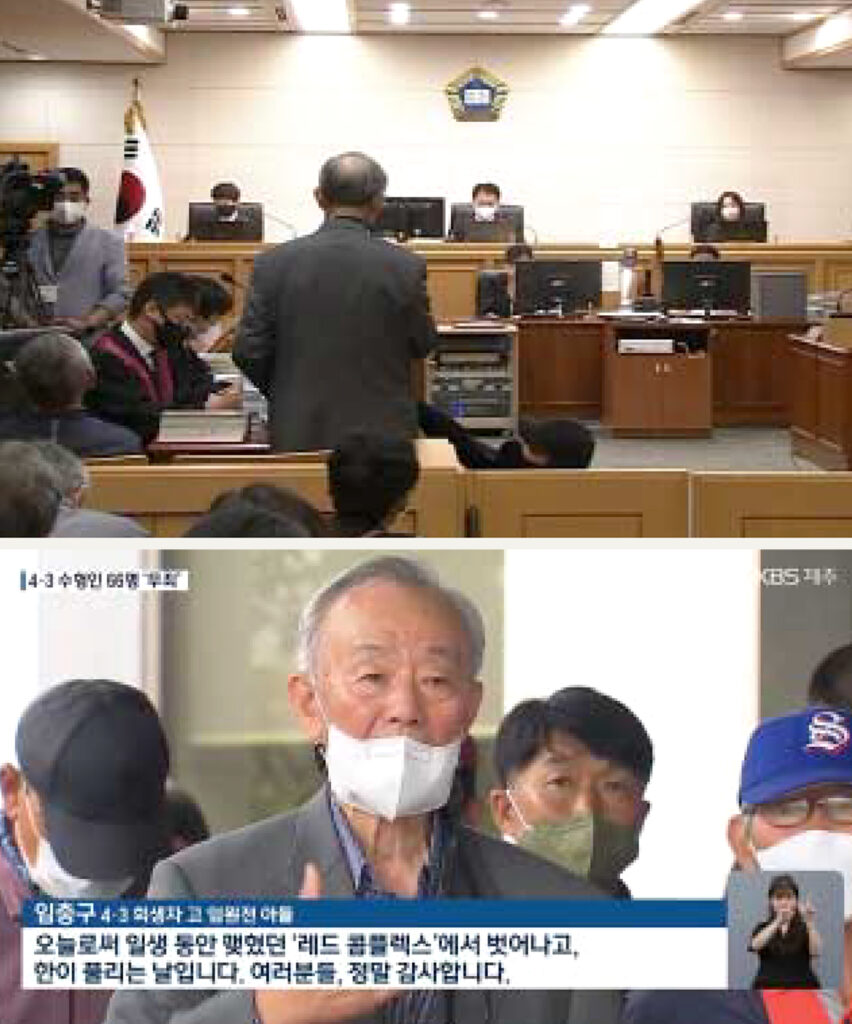
(Above) Lim makes his statement about his father, Lim Won-jeon, in Chamber 201 of Jeju District Court on Oct. 4, 2022. Lim is interviewed by reporters after his father has been found innocent.
Jeju 4·3 was a resistance of ordinary people!
Many educated people in Jeju, including my father, were influenced by socialism. Isn’t socialism the dream of everyone being well off? But the Rhee Syngman regime condemned it as communism. Jeju 4·3 should be rightfully called the resistance of ordinary people. The enactment of the Jeju 4·3 Special Act, the fact-finding report, the retrial, and compensation tell me something is going right. But there is one thing missing. Why are we shy about investigating the assailant? Is it something we can’t do? Or won’t do? Without investigating or holding the assailants responsible, neither fact-finding nor the recovery of honor would be genuine. I am not saying we should focus on penalizing them. Most of them are long gone. But at least we can document it and leave it as part of history. We should describe them in the textbooks and let the next generations take it on. Only then can Jeju 4·3 can be called a rightful resistance. No more ideological verification. No more red complex. Now is the time for the victims’ families to speak out. With the indemnification and compensation given to us now, we must find the reasons for the victims’ unjust deaths. It is our duty as their children.